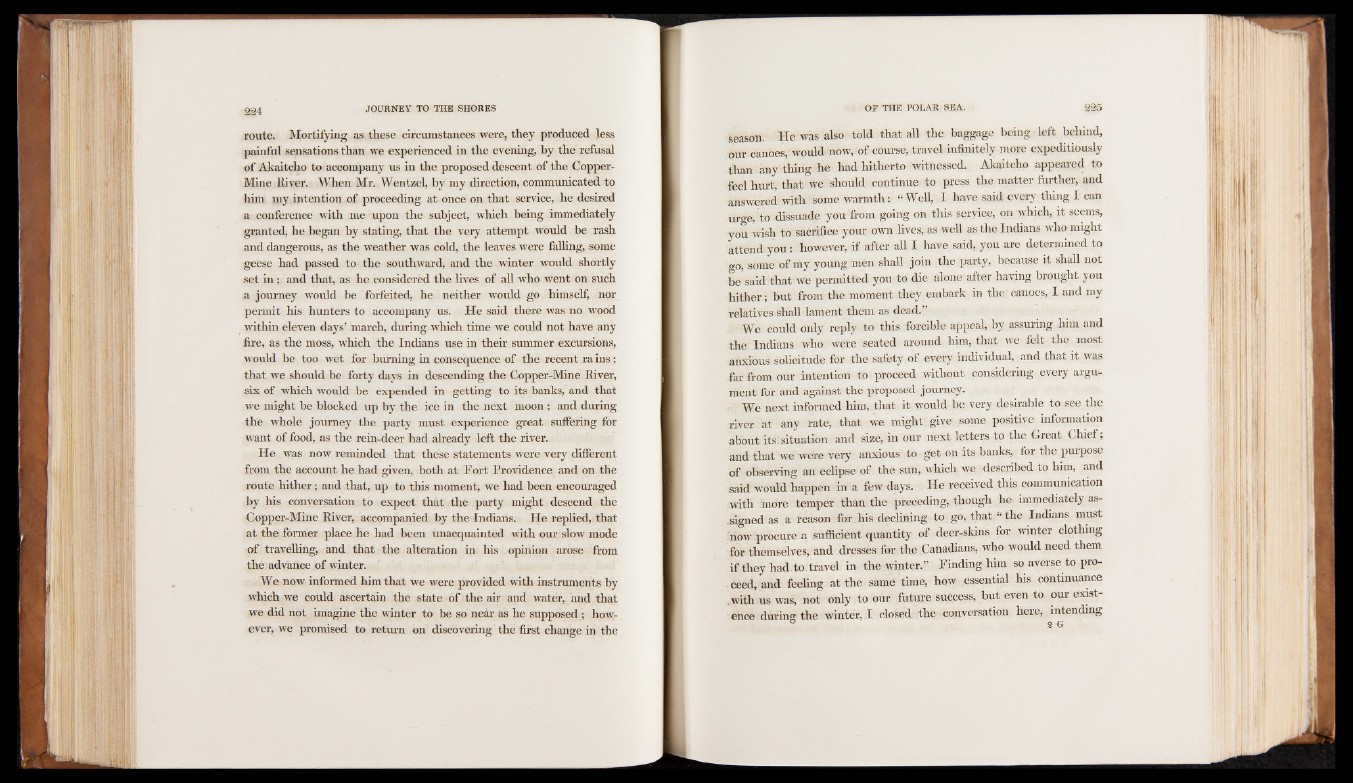
route. Mortifying as these circumstances were, they produced less
painful sensations than we experienced in the evening, by the refusal
of Akaitcho to accompany us in the proposed descent of the Copper-
Mine River. When Mr. Wentzel, by my direction, communicated to
him my intention of proceeding at once on that service, he desired
a conference with me upon the subject, which being immediately
granted, he began by stating, that the very attempt would be rash
and dangerous, as the weather was cold, the leaves were falling, some
geese had passed to the southward, and the winter would shortly
set in ; and that, as he considered the lives of all who went on such
a journey would be forfeited, he neither would go himself, nor
permit his hunters to accompany us. He said there was no wood
within eleven days’ march, during which time we could not have any
fire, as the moss, which the Indians use in their summer excursions,
would be too wet for burning in consequence of the recent ra his;
that we should be forty days in descending the Copper-Mine River,
six of which would be expended in getting to its banks, and that
we might be blocked up by the ice in the next moon ; and during
the whole journey the party must experience great suffering for
want of food, as the rein-deer had already left the river.
He was now reminded that these statements were very different
from the account he had given, both at F ort Providence and on the
route hither; and that, up to this moment, we had been encouraged
by his conversation to expect that the party might descend the
Copper-Mine River, accompanied by the Indians. He replied, that
at the former place he had been unacquainted with our slow mode
of travelling, and that the alteration in his opinion arose from
thé advance of winter.
We now informed him that we were provided with instruments by
which we could ascertain the state of the air and water, and that
we did not imagine the winter to be so near as he supposed ; however,
we promised to return on discovering the first change in the
season. He was also told that all the baggage being left behind,
our canoes, would now, of course, travel infinitely more expeditiously
than any thing he had hitherto witnessed. Akaitcho appeared to
feel hurt, that we should continue to press the matter further, and
answered with some warmth: “ Well, 1 have said every thing I can
urge, to dissuade you from going on this service, on which, it seems,
you wish to sacrifice your own lives, as well as the Indians who might
attend you: however, if after all I have said, you are determined to
go, some of my young men shall join the party, because it shall not
be said that we permitted you to die alone after having brought you
hither; but from the moment they embark in the canoes, I and my
relatives.shall lament them as dead.”
We could only reply to this forcible appeal, by assuring him and
the Indians who were seated around him, that we felt the most
anxious solicitude for the safety of every individual, and that it was
far from, our intention to proceed without considering every argument
for and against the proposed journey.
, We next informed him, that it would be very desirable to see the
river at any rate, that we might give some positive information
about its.situation and size, in our next letters to the Great Chief,
and that we were very anxious to get on its banks, for the purpose
of observing an eclipse of the sun, which we described to him, and
said would happen in a few days. He received this communication
with more temper than the preceding, though he immediately assigned
as a reason for his declining to go, that “ the Indians must
now procure a sufficient quantity of deer-skins for winter clothing
for themselves, and dresses for the Canadians, who would need them
if they had. to travel in the winter.” Finding him so averse to proceed,
and feeling at the same time, how essential his continuance
with us was, not only to our future success, but even to our existence
during the winter, I closed the conversation here, intending